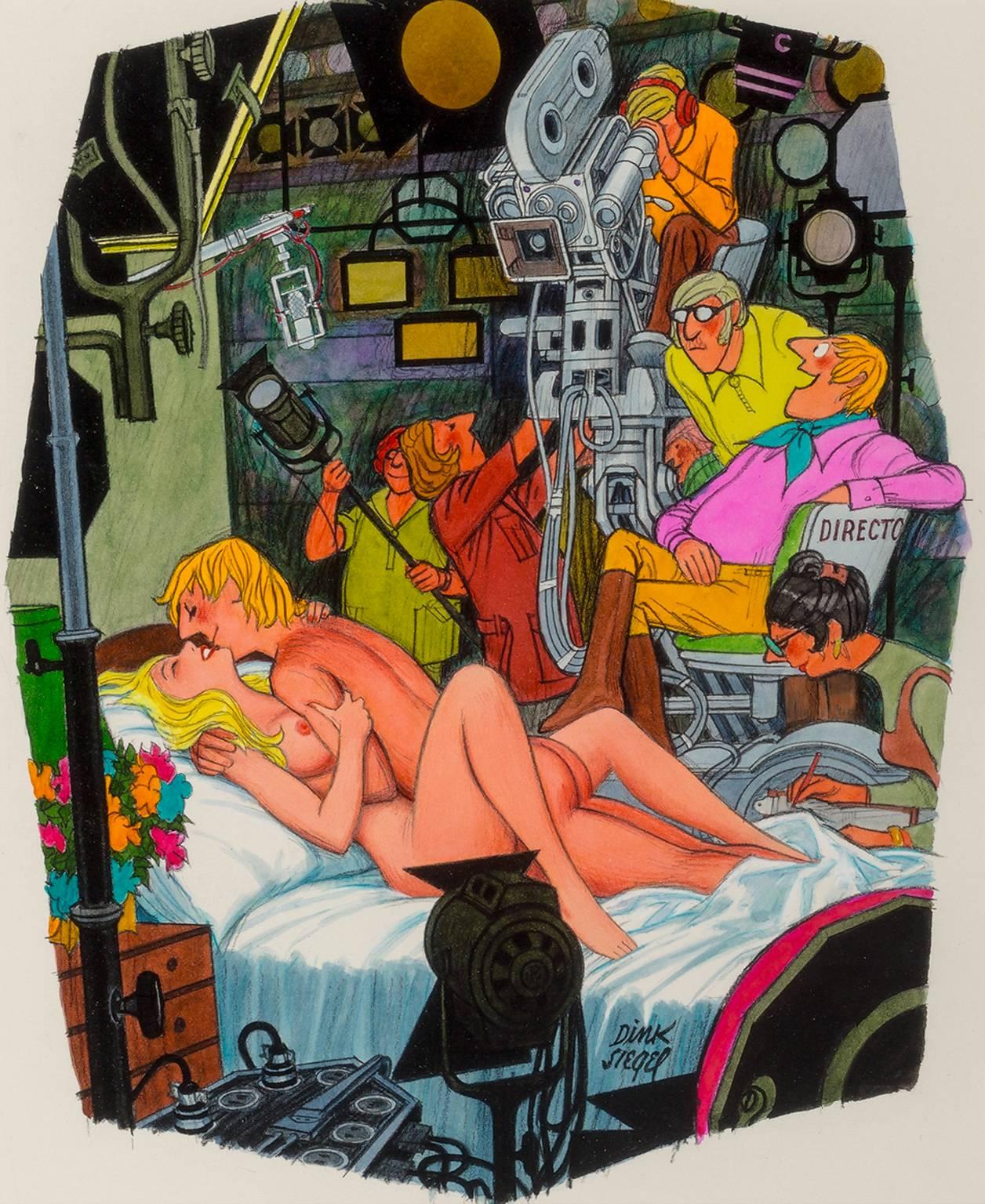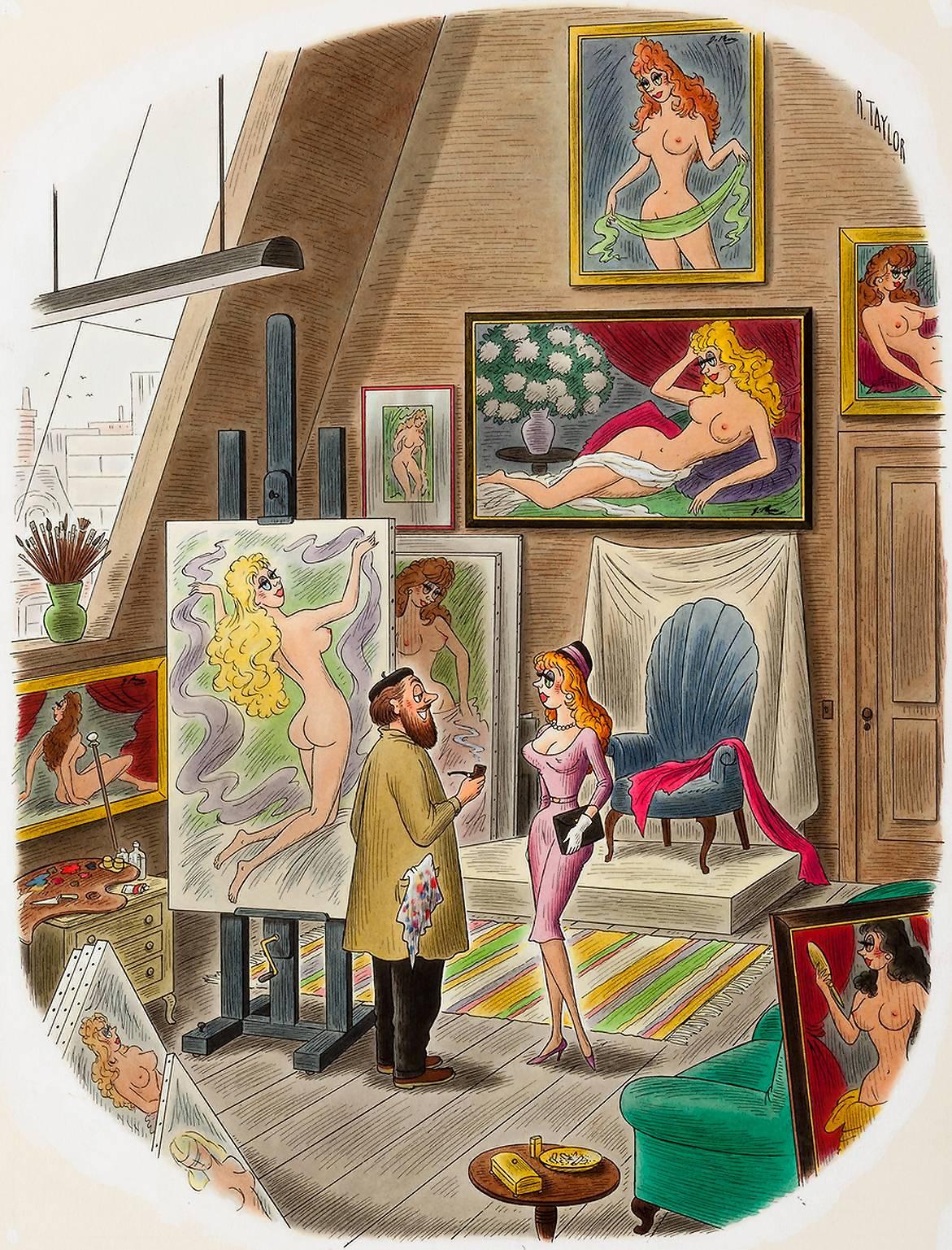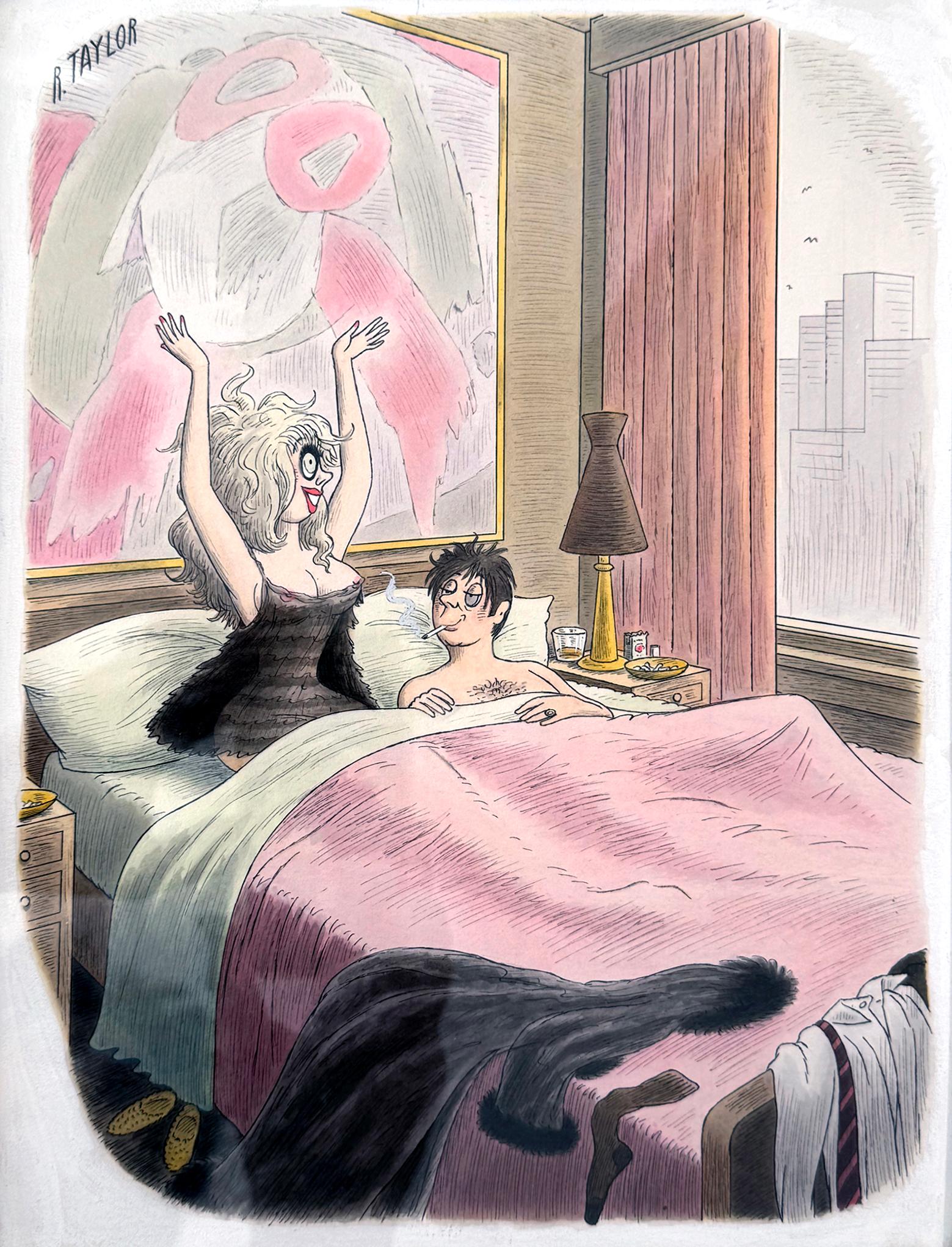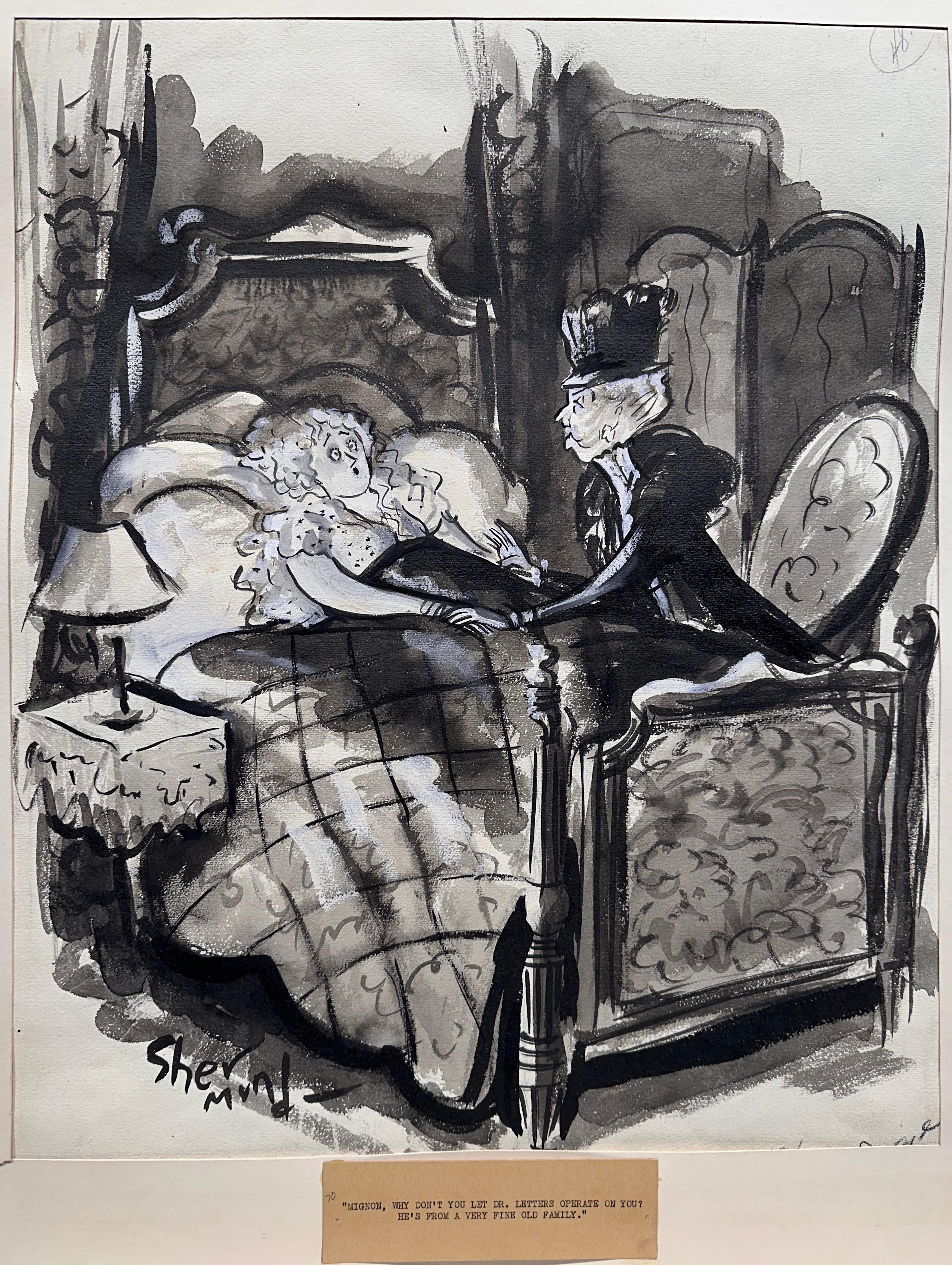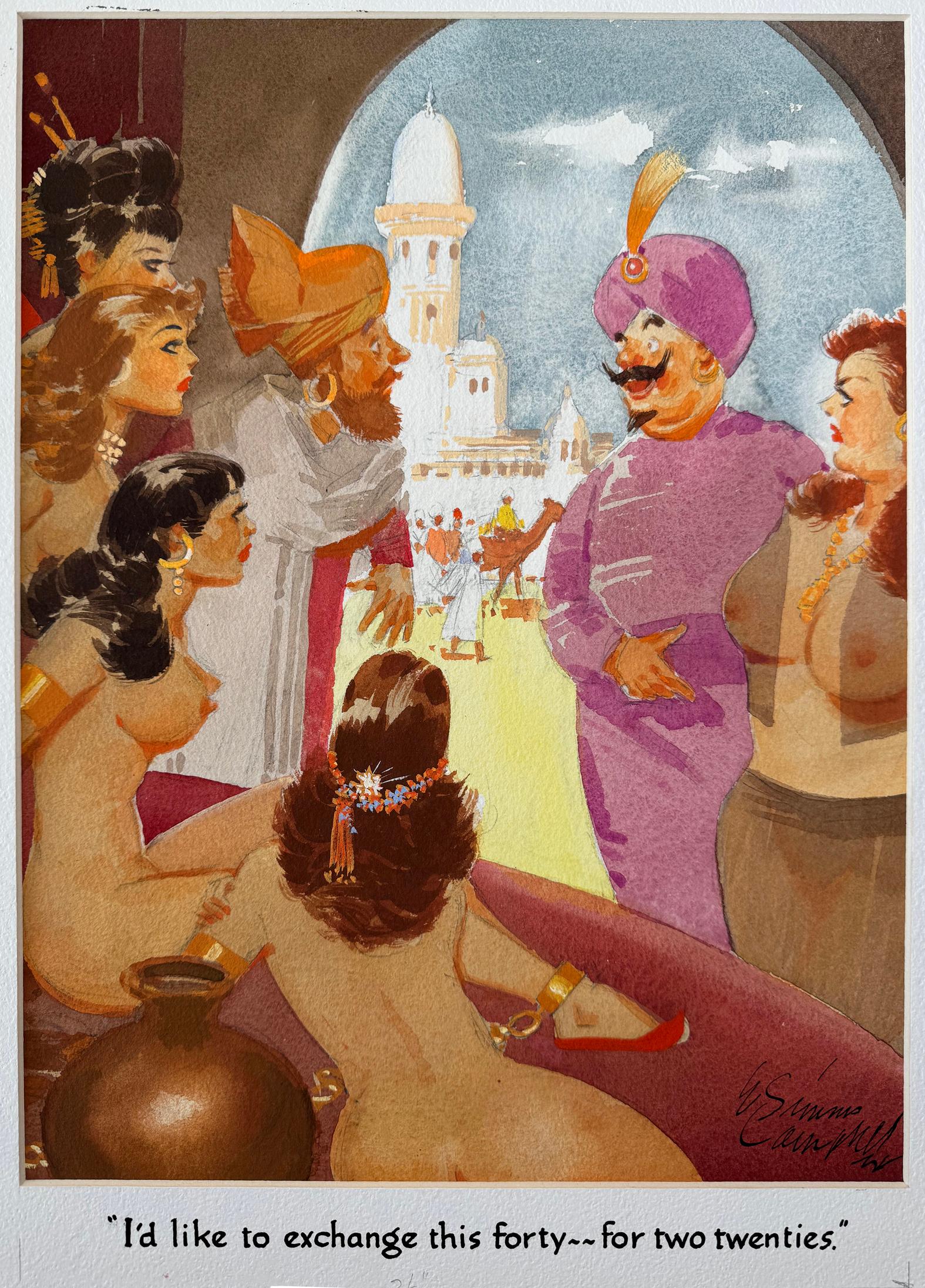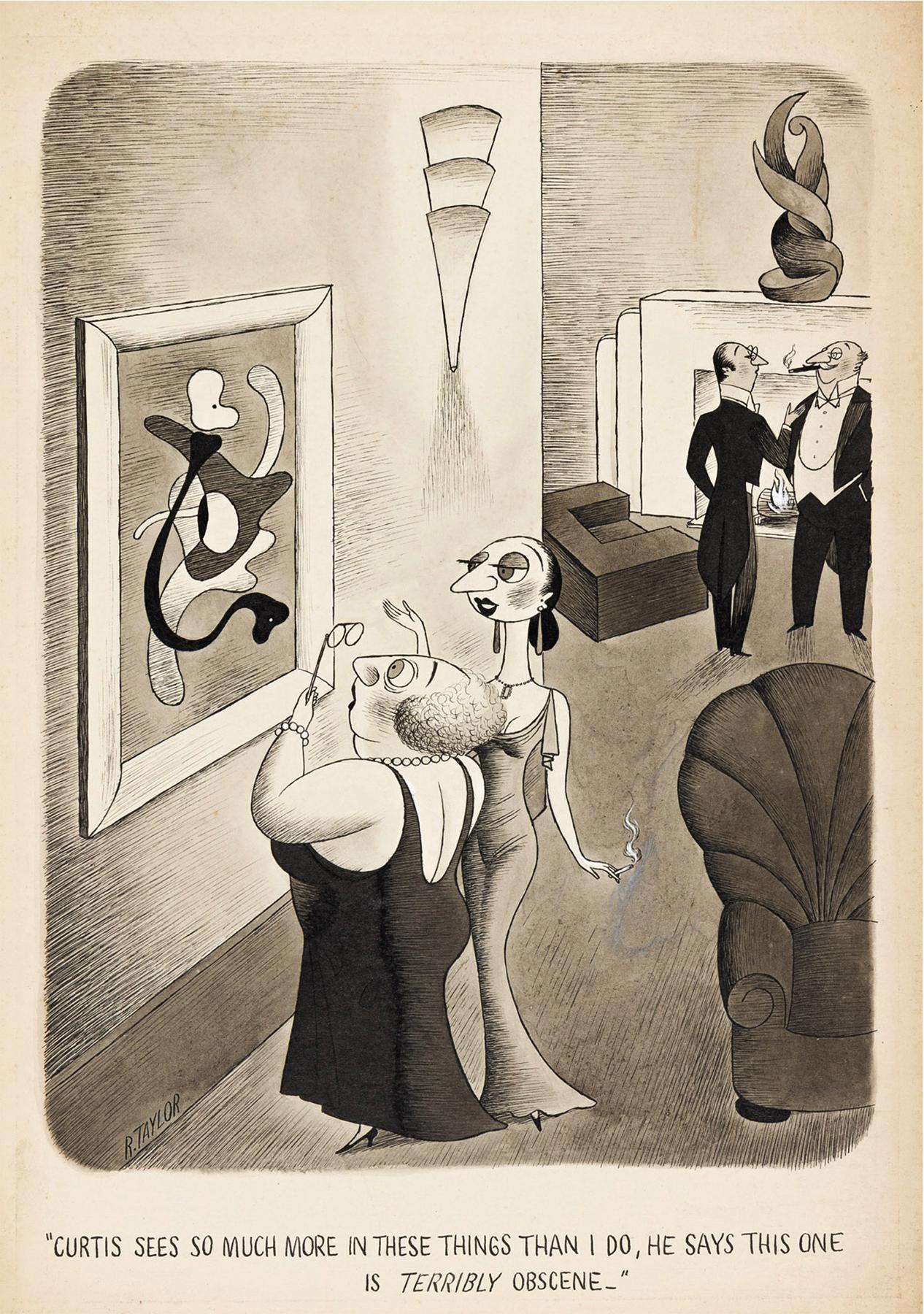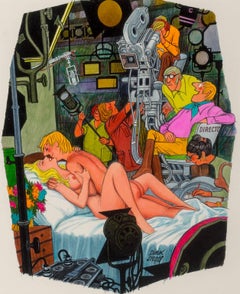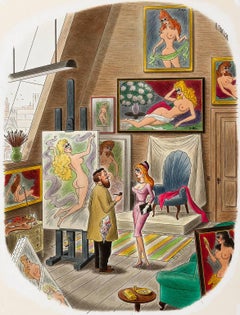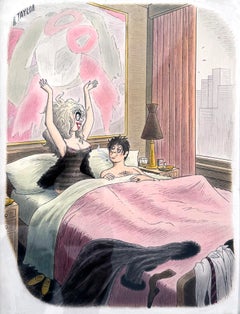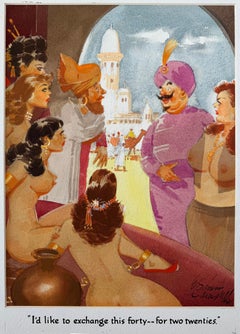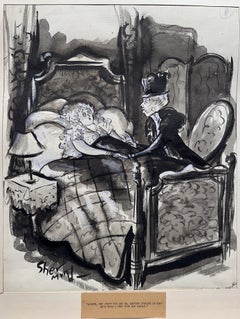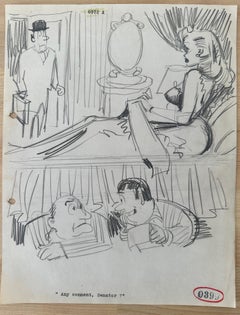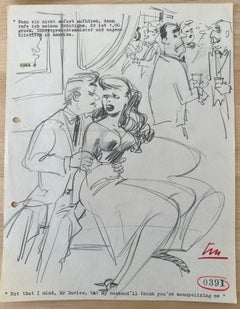Items Similar to Sexy Evening in Bed Phone Call - Playboy Cartoon Humor - Francis Wilford Smith
Want more images or videos?
Request additional images or videos from the seller
1 of 11
SmilbySexy Evening in Bed Phone Call - Playboy Cartoon Humor - Francis Wilford Smith1975
1975
$12,500
£9,448.45
€10,857.95
CA$17,406.17
A$19,363.65
CHF 10,150.67
MX$236,619.13
NOK 129,256.12
SEK 121,676.76
DKK 81,050.48
Shipping
Retrieving quote...The 1stDibs Promise:
Authenticity Guarantee,
Money-Back Guarantee,
24-Hour Cancellation
About the Item
Cartoon art is the original Conceptual Art.
Renowned British Illustrator Smilby (Francis Wilford Smith) conceptualizes a Playboy cartoon so good that no caption is needed. The existing caption, "Bancroft? George Bancroft? - - never heard of him -- you've got the wrong number," is superfluous. In this work, Smilby depicts an annoyed older man in bed with a beautiful, much younger woman. He is interrupted by a nocturnal phone call asking for a "George Bancroft". The older man is unaware that the "George Bancroft" is hiding under the bed. Everyone is in on the joke except the older man.
Signed Smilby lower right - Hi- end Framed Dimensions 17 X 13.5 Inches under Tru Vue Museum Glass.
Provenance: Collection of Craig MacMillan
Collection of Louis K. Meisel.
The uploaded video on 1stDibs is coming up a bit off color. Refer to the still images for more accurate color
- Creator:Smilby (1927 - 2009, British)
- Creation Year:1975
- Dimensions:Height: 13 in (33.02 cm)Width: 9.5 in (24.13 cm)
- Medium:
- Movement & Style:
- Period:
- Condition:Very good with crisp clean and saturated color -.
- Gallery Location:Miami, FL
- Reference Number:1stDibs: LU385316679902

About the Seller
4.9
Gold Seller
Premium sellers maintaining a 4.3+ rating and 24-hour response times
Established in 2005
1stDibs seller since 2016
115 sales on 1stDibs
Typical response time: 1 hour
- ShippingRetrieving quote...Shipping from: Miami, FL
- Return Policy
Authenticity Guarantee
In the unlikely event there’s an issue with an item’s authenticity, contact us within 1 year for a full refund. DetailsMoney-Back Guarantee
If your item is not as described, is damaged in transit, or does not arrive, contact us within 7 days for a full refund. Details24-Hour Cancellation
You have a 24-hour grace period in which to reconsider your purchase, with no questions asked.Vetted Professional Sellers
Our world-class sellers must adhere to strict standards for service and quality, maintaining the integrity of our listings.Price-Match Guarantee
If you find that a seller listed the same item for a lower price elsewhere, we’ll match it.Trusted Global Delivery
Our best-in-class carrier network provides specialized shipping options worldwide, including custom delivery.More From This Seller
View AllThat's a Wrap, Playboy cartoon Illustration ,
By Dink Siegel
Located in Miami, FL
Dink Siegel (American, 1910-2003)
That's a Wrap, Playboy cartoon, August 1973
Mixed media on board
11.25 x 8.5 in.
Signed lower right
Category
1970s American Modern Figurative Drawings and Watercolors
Materials
Mixed Media
Playboy cartoon Illustration, "For Posing, My Terms Are a Dollar an Hour, Room
By Richard Taylor
Located in Miami, FL
Put aside Richard Taylor's dry wit. Look at his masterfully rendered figures and brilliantly constructed compositions based on a two-point perspective. Clearly, he is an underrated and overlooked talent in the class of Charles Addams. Above all, Taylor, with his heavely-lidded-eyed figure, has a style of his own. An artist who has an instantly recognized style - unique to him/her is a rarity in today's artworld of derivative artists.
"For Posing, My Terms Are a Dollar an Hour, Room, and Board", Playboy cartoon illustration...
Category
1960s Contemporary Figurative Paintings
Materials
Watercolor
Nude Girl Epiphany Playboy Cartoon - Women's Liberation Moment
By Richard Taylor
Located in Miami, FL
Richard Taylor is one of the great Cartoonists. He is celebrated for his dry sense of humor and skill in depicting people in subtle narratives. His instantly recognizable style is ...
Category
1960s Conceptual Nude Drawings and Watercolors
Materials
Ink, Watercolor, Gouache, Illustration Board, Pencil
Harem: Sexy Nude Girl Illustration for Playboy. First Black Illustrator
By E. Simms Campbell
Located in Miami, FL
Playboy Magazine ran this joke cartoon illustration in color on page 43 for the October 1960 edition.
Signed lower right.
The work is executed on a heavy Whatman Illustration board....
Category
1960s American Modern Nude Drawings and Watercolors
Materials
Watercolor, Illustration Board, Pencil, Gouache
Art Lovers and Art Critics Analyzing Obscene Painting. Cartoon
By Richard Taylor
Located in Miami, FL
Cartoonist Richard Taylor was trained in academic art. He frequently comments on abstract art which was the new and radical thing at the time. "Curtis sees so much more in these thi...
Category
1940s Academic Portrait Drawings and Watercolors
Materials
Ink, Board
Wish Not to Be Disturbed for the Duration of Winter - Playboy Cartoon
Located in Miami, FL
Gahan Wilson was the Master of the macabre, and most of his work is associated with Charles Addams. The beauty of a Gahan Wilson is that is a payoff pu...
Category
1960s Conceptual Figurative Paintings
Materials
Ink, Gouache, Color Pencil
You May Also Like
Life Magazine Satirical Society Cartoon Illustration
Located in Wilton Manors, FL
Barbara Shermund (1899-1978). Society Satirical Cartoon, ca. 1940s. Gouache on heavy illustration paper, image measures 17 x 14 inches; 23 x 20 inches in matting. Signed lower left. Very good condition but matting panel should be replaced. Unframed.
Provenance: Ethel Maud Mott Herman, artist (1883-1984), West Orange NJ.
For two decades, she drew almost 600 cartoons for The New Yorker with female characters that commented on life with wit, intelligence and irony.
In the mid-1920s, Harold Ross, the founder of a new magazine called The New Yorker, was looking for cartoonists who could create sardonic, highbrow illustrations accompanied by witty captions that would function as social critiques.
He found that talent in Barbara Shermund.
For about two decades, until the 1940s, Shermund helped Ross and his first art editor, Rea Irvin, realize their vision by contributing almost 600 cartoons and sassy captions with a fresh, feminist voice.
Her cartoons commented on life with wit, intelligence and irony, using female characters who critiqued the patriarchy and celebrated speakeasies, cafes, spunky women and leisure. They spoke directly to flapper women of the era who defied convention with a new sense of political, social and economic independence.
“Shermund’s women spoke their minds about sex, marriage and society; smoked cigarettes and drank; and poked fun at everything in an era when it was not common to see young women doing so,” Caitlin A. McGurk wrote in 2020 for the Art Students League.
In one Shermund cartoon, published in The New Yorker in 1928, two forlorn women sit and chat on couches. “Yeah,” one says, “I guess the best thing to do is to just get married and forget about love.”
“While for many, the idea of a New Yorker cartoon conjures a highbrow, dry non sequitur — often more alienating than familiar — Shermund’s cartoons are the antithesis,” wrote McGurk, who is an associate curator and assistant professor at Ohio State University’s Billy Ireland Cartoon Library & Museum. “They are about human nature, relationships, youth and age.” (McGurk is writing a book about Shermund.
And yet by the 1940s and ’50s, as America’s postwar focus shifted to domestic life, Shermund’s feminist voice and cool critique of society fell out of vogue. Her last cartoon appeared in The New Yorker in 1944, and much of her life and career after that remains unclear. No major newspaper wrote about her death in 1978 — The New York Times was on strike then, along with The Daily News and The New York Post — and her ashes sat in a New Jersey funeral...
Category
1940s Realist Figurative Paintings
Materials
Gouache
Humorous Gentleman's Magazine cartoon
Located in Wilton Manors, FL
Cartoon sketch, ca. 1955. Pencil on paper, sheet measures 8.5 x 11 inches. Unsigned with editor's notations.
From a group of sketches meant to be preliminary drafts for editor appro...
Category
Mid-20th Century Figurative Drawings and Watercolors
Materials
Pencil
$125 Sale Price
50% Off
Humorous Gentleman's Magazine cartoon
Located in Wilton Manors, FL
Cartoon sketch, ca. 1955. Pencil on paper, sheet measures 8.5 x 11 inches. Unsigned with editor's notations.
From a group of sketches meant to be preliminary drafts for editor appro...
Category
Mid-20th Century Figurative Drawings and Watercolors
Materials
Pencil
$125 Sale Price
50% Off
Gawkers, Original Conte Crayon and Watercolor Illustration by Bill Ward
Located in Long Island City, NY
Artist: Bill Ward, American (1919 - 1998)
Title: Gawkers
Year: circa 1981
Medium: Graphite and Watercolor on Paper, signed l.r.
Size: 23 in. x 17 in. (58.42 ...
Category
1980s Post-Modern Figurative Drawings and Watercolors
Materials
Graphite
Life Magazine Art Deco Showgirls Cartoon
Located in Wilton Manors, FL
Barbara Shermund (1899-1978). Showgirls Cartoon for Life Magazine, 1934. Ink, watercolor and gouache on heavy illustration paper, matting window measures 16.5 x 13 inches; sheet measures 19 x 15 inches; Matting panel measures 20 x 23 inches. Signed lower right. Very good condition with discoloration and toning in margins. Unframed.
Provenance: Ethel Maud Mott Herman, artist (1883-1984), West Orange NJ.
For two decades, she drew almost 600 cartoons for The New Yorker with female characters that commented on life with wit, intelligence and irony.
In the mid-1920s, Harold Ross, the founder of a new magazine called The New Yorker, was looking for cartoonists who could create sardonic, highbrow illustrations accompanied by witty captions that would function as social critiques.
He found that talent in Barbara Shermund.
For about two decades, until the 1940s, Shermund helped Ross and his first art editor, Rea Irvin, realize their vision by contributing almost 600 cartoons and sassy captions with a fresh, feminist voice.
Her cartoons commented on life with wit, intelligence and irony, using female characters who critiqued the patriarchy and celebrated speakeasies, cafes, spunky women and leisure. They spoke directly to flapper women of the era who defied convention with a new sense of political, social and economic independence.
“Shermund’s women spoke their minds about sex, marriage and society; smoked cigarettes and drank; and poked fun at everything in an era when it was not common to see young women doing so,” Caitlin A. McGurk wrote in 2020 for the Art Students League.
In one Shermund cartoon, published in The New Yorker in 1928, two forlorn women sit and chat on couches. “Yeah,” one says, “I guess the best thing to do is to just get married and forget about love.”
“While for many, the idea of a New Yorker cartoon conjures a highbrow, dry non sequitur — often more alienating than familiar — Shermund’s cartoons are the antithesis,” wrote McGurk, who is an associate curator and assistant professor at Ohio State University’s Billy Ireland Cartoon Library & Museum. “They are about human nature, relationships, youth and age.” (McGurk is writing a book about Shermund.
And yet by the 1940s and ’50s, as America’s postwar focus shifted to domestic life, Shermund’s feminist voice and cool critique of society fell out of vogue. Her last cartoon appeared in The New Yorker in 1944, and much of her life and career after that remains unclear. No major newspaper wrote about her death in 1978 — The New York Times was on strike then, along with The Daily News and The New York Post — and her ashes sat in a New Jersey funeral home...
Category
1930s Art Deco Figurative Paintings
Materials
Ink, Gouache
$3,250 Sale Price
35% Off
Humorous Gentleman's Magazine cartoon
Located in Wilton Manors, FL
Cartoon sketch, ca. 1955. Pencil on paper, sheet measures 8.5 x 11 inches. Unsigned with editor's notations.
From a group of sketches meant to be preliminary drafts for editor appro...
Category
Mid-20th Century Figurative Drawings and Watercolors
Materials
Pencil
$125 Sale Price
50% Off
